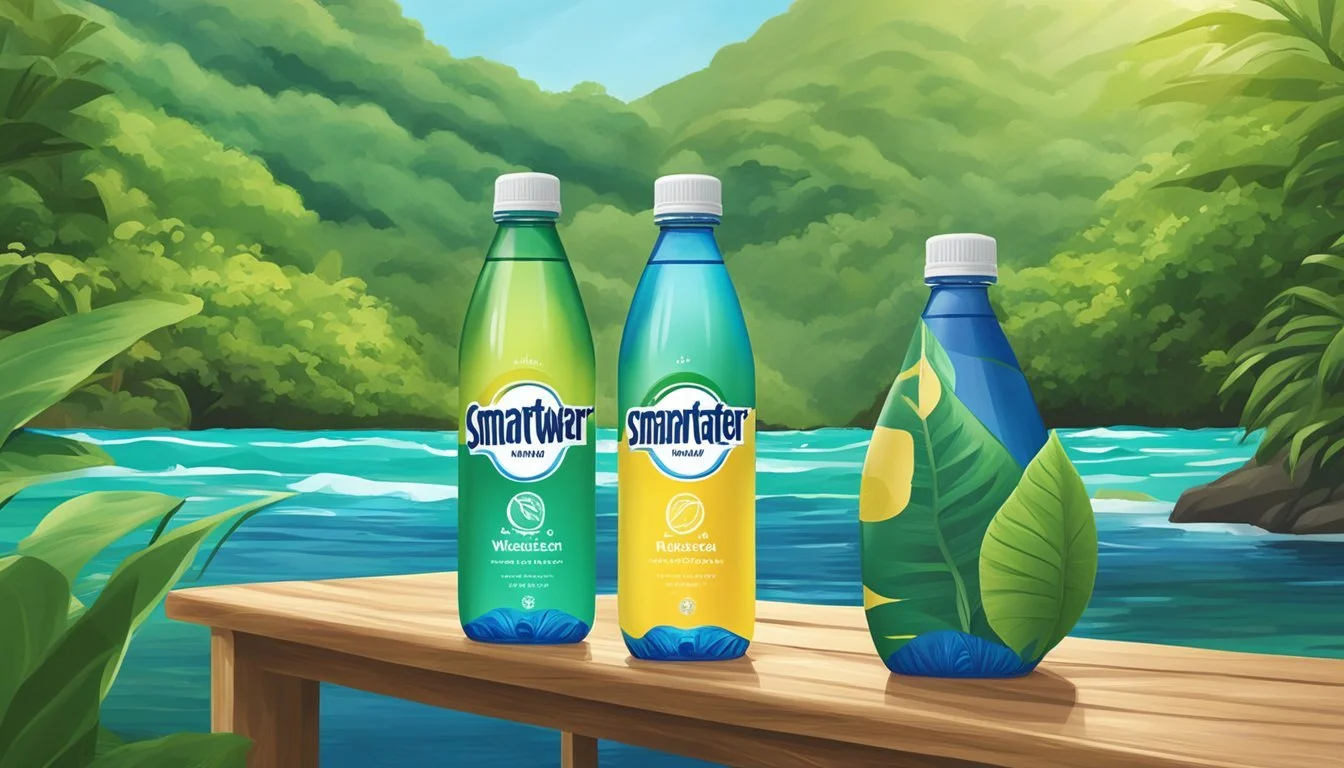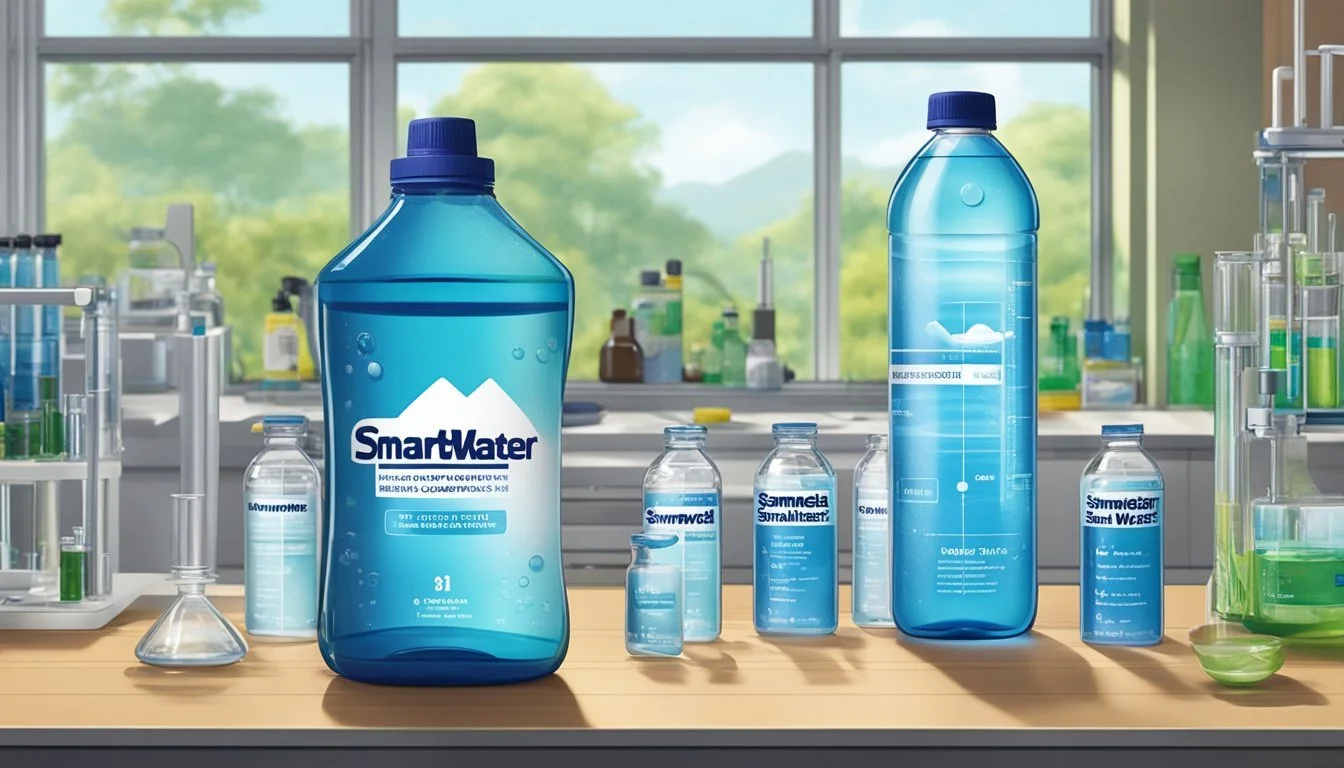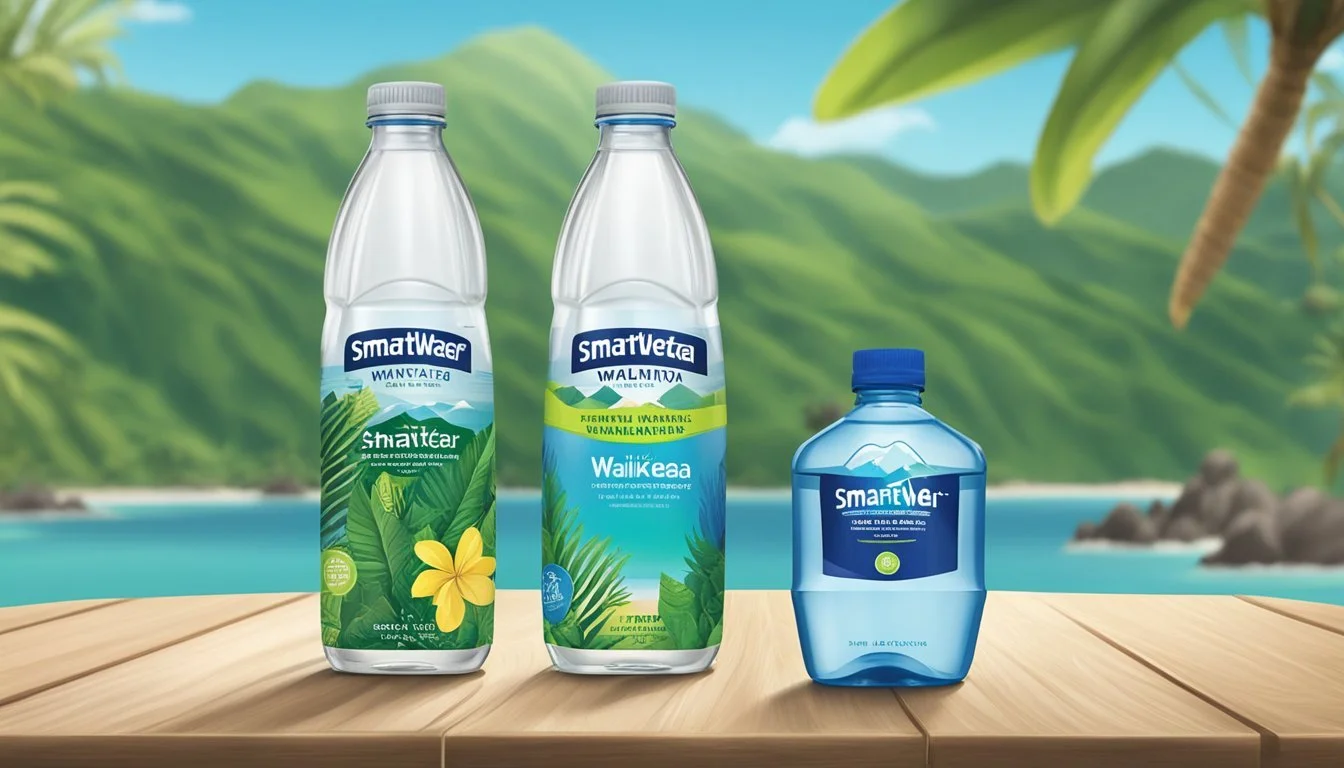Smartwater vs. Waiakea
Comparing Top Bottled Waters
When it comes to choosing between Smartwater and Waiakea, consumers often wonder which brand offers better quality. Smartwater is known for its vapor-distilled process and the addition of electrolytes for taste. This leads to a clean and crisp flavor that many find appe
Waiakea, on the other hand, boasts natural alkalinity with a pH range of 7.6 to 8.2, sourced from Hawaiian volcanic wells. This water is rich in essential minerals and electrolytes, which contribute to its unique composition. Waiakea's naturally high alkaline pH and sustainability practices make it a standout choice for many health-conscious individuals.
While both brands have their merits, the choice ultimately depends on what specific qualities and benefits the consumer is looking for in their bottled water. Whether it's the hydration benefits of Smartwater's purity and electrolyte blend, or the mineral-rich, eco-friendly Waiakea, each offers distinct advantages.
Understanding Bottled Water
Bottled water comes in various types, each with distinct characteristics determined by their source and treatment methods. Regulations by bodies like the FDA ensure safety and quality standards.
Definition and Types of Bottled Water
Bottled water is available in multiple varieties, defined by the source and purification processes. Natural spring water comes from underground sources and must be collected at the spring. Purified water undergoes extensive filtering, such as reverse osmosis, to remove impurities. Alkaline water has a higher pH level, typically achieved through ionization methods. Mineral water naturally contains dissolved minerals from its source.
These types differ in taste, mineral content, and processing techniques. Consumers choose based on preferences, health benefits, and specific standards like BPA-free packaging.
Regulations and Standards
Regulatory bodies like the FDA oversee bottled water in the United States. The FDA ensures bottled water meets the same safety and health standards as public drinking water. This includes setting limits on contaminants and enforcing labeling requirements.
Bottled water must comply with Good Manufacturing Practices (GMP), and specific types like natural spring water have unique criteria to meet. Effective regulations and standards guarantee the consistency, safety, and quality of bottled water available to consumers.
Brand Histories
SmartWater and Waiakea have unique origins that highlight their commitment to quality and sustainability. One brand is rooted in global corporate expertise while the other is grounded in environmental responsibility.
SmartWater: The Coca-Cola Journey
SmartWater, a brand under the Coca-Cola Company, was introduced in 1996. Coca-Cola acquired it in 2007, expanding its range of hydration products. SmartWater is known for its vapor-distilled purity, which mimics the hydrologic cycle.
Electrolytes like calcium, magnesium, and potassium are added to enhance taste. Its sleek bottle design and marketing campaigns have helped SmartWater stand out in the premium bottled water market. Promotional efforts often capitalize on transparency, purity, and a minimalist approach.
Waiakea: A Sustainable Start
Waiakea began in 2012 and is sourced from Hawaii, specifically from the Mauna Loa volcano. The company focuses on sustainability and environmental stewardship. Waiakea water filters through volcanic rock, enriching it with minerals and imparting a pH range of 7.6 to 8.2.
The brand boasts certification as Carbon Neutral and uses 100% RPET bottles. Additionally, Waiakea commits to social responsibility by donating a portion of its revenue to global and local nonprofits. These initiatives underline Waiakea's promise of purity, sustainability, and community contribution.
Water Sources and Purification
This section explores the sources and purification processes of Smartwater and Waiakea, highlighting their unique methods and origins to provide clarity on which might suit your preferences better.
SmartWater: Vapor Distillation
Smartwater is known for its vapor distillation process. The water is initially sourced from municipal supplies.
Then, it undergoes a purification process where it is heated until it becomes vapor.
This vapor is collected and condensed back into liquid water, removing impurities.
To enhance taste and mineral content, electrolytes such as calcium, magnesium, and potassium are added post-distillation.
This method ensures 99.9% purity, providing high-quality, clean water. Reverse osmosis is another step used occasionally to enhance purity, ensuring a dependable product for hydration needs.
Waiakea: Hawaiian Volcanic Origins
Waiakea water boasts a unique origin, being sourced from the volcanic wells in Hawaii.
The water journeys through layers of porous volcanic rock in the Mauna Loa volcano.
During this passage, it naturally acquires minerals such as silica, electrolytes, and other essential minerals.
This natural filtration not only purifies the water but also imparts alkaline properties with a pH range of 7.6 to 8.2.
The water is bottled directly at the source, maintaining its purity and freshness. This spring source and filtration process add to Waiakea's appeal for its natural and mineral-rich profile.
Chemical Composition
When comparing Smartwater and Waiakea, examining the chemical makeup provides insight into their potential health benefits. Both brands offer different pH levels, minerals, and electrolytes that cater to various consumer needs.
pH Levels and Alkalinity
Waiakea boasts a naturally alkaline pH level ranging from 7.6 to 8.2. This alkalinity comes from the volcanic rock through which it filters, enriching it with minerals. This higher pH can neutralize acid in the body, promoting balanced internal pH levels.
Smartwater, on the other hand, maintains a neutral pH of around 7. This pH level is achieved through vapor distillation, which purifies the water. While it lacks the natural alkalinity of Waiakea, it offers consistent purity without additional acidity or alkalinity.
Minerals and Electrolytes
Waiakea water contains natural minerals and electrolytes, including silica, calcium, magnesium, potassium, and sodium. Silica supports bone, skin, and hair health, while calcium and magnesium contribute to bone and muscle function. The presence of these minerals comes from the water's journey through volcanic rock.
Smartwater is enhanced with added electrolytes, such as potassium, calcium, and magnesium, after the distillation process. This ensures a clean, crisp taste but lacks naturally occurring minerals. The added electrolytes serve to restore balance and hydration, especially during physical activities.
Mineral/Electrolyte Waiakea Smartwater Silica Present Absent Calcium Present Added Magnesium Present Added Potassium Present Added Sodium Present Added in moderation
Each brand offers unique benefits through their chemical composition, catering to different health preferences and needs.
Health and Hydration
When comparing Smartwater and Waiakea, it is important to consider how each brand meets hydration needs and what potential health benefits they offer. Both brands bring unique qualities to the table, impacting overall well-being.
Evaluating Hydration Needs
Smartwater is known for its vapor-distilled process, which mimics the hydrological cycle. It is then infused with electrolytes like potassium, calcium, and magnesium to enhance taste, making it a suitable choice for those looking to stay hydrated. The electrolytes help maintain fluid balance in the body, which is essential for hydration.
Waiakea, sourced from volcanic wells in Hawaii, also contains electrolytes but in a naturally occurring form. It comes with a pH range of 7.6 to 8.2, making it slightly alkaline. This makes Waiakea a good option for individuals who prefer their water with a bit of natural alkalinity and essential minerals.
Potential Health Benefits
Smartwater's primary health benefit is the inclusion of electrolytes, which can aid in fluid retention and prevent dehydration. While it may not distinctly offer additional health benefits, it ensures basic hydration needs are met effectively.
Waiakea water contains not only electrolytes but also minerals like silica, which can support bone, hair, skin, and nail health. Silica is particularly notable for its role in collagen synthesis, potentially benefiting connective tissue health.
Alkaline properties of Waiakea may provide additional health advantages such as improved gut health. Some studies suggest alkaline water can help balance pH levels in the body, leading to better overall wellness.
Taste and Purity of Water
Taste and purity are critical factors when comparing bottled water options. Both Smartwater and Waiakea claim high standards, but their differences set them apart.
Taste Profiles of SmartWater and Waiakea
Smartwater undergoes a vapor distillation process, which aims to mimic the hydrologic cycle. This results in a clean and crisp taste, often described as smooth with a neutral pH level of around 7. The addition of electrolytes like calcium, magnesium, and potassium for taste further enhances its refreshing quality without altering its purity.
Waiakea, sourced from Hawaiian volcanic wells, boasts a naturally alkaline pH range between 7.6 and 8.2. The water's mineral composition, which includes silica, calcium, and magnesium, imparts a slightly sweet, smooth, and mineral-rich taste. This unique profile appeals to those who prefer an alkaline balance and a taste that stands out.
Purity and Presence of Contaminants
Smartwater is produced using reverse osmosis and vapor distillation, which effectively remove impurities and contaminants. Regular testing ensures the absence of heavy metals like lead, arsenic, and mercury. There is also a focus on eliminating PFAS chemicals to maintain high purity levels.
Waiakea's purity is ensured at the source. The water flows through porous volcanic rock, providing natural filtration and enhancing purity. Regular third-party testing verifies low levels of contaminants, ensuring negligible traces of heavy metals and harmful chemicals. The brand's commitment to sustainability also includes maintaining the environmental integrity of its pristine source.
Environmental and Sustainability Considerations
When evaluating Smartwater and Waiakea, it is important to consider their environmental impact and sustainability practices. Examining their approaches to packaging and eco-friendly initiatives provides insight into their overall commitment to the environment.
Packaging and Plastic Bottles
Smartwater mainly uses traditional plastic bottles. While they do offer a version with a higher pH, typical packaging does not consistently use recycled materials. This contributes to significant plastic waste.
Waiakea, on the other hand, utilizes 100% post-consumer recycled PET (rPET). This type of plastic is more eco-friendly, as it requires less energy and water to produce. By choosing Waiakea, consumers support lower carbon emissions and a reduction in environmental waste from plastic bottles.
Eco-Friendly Practices and Impact
Smartwater does incorporate some green initiatives but has limited transparency about its comprehensive environmental actions. While it markets electrolyte-enhanced water, there is minimal information on sustainable production practices.
Waiakea distinguishes itself with its holistic approach. The company has achieved CarbonNeutral certification and donates over 5% of revenue to environmental and social causes. These practices significantly reduce their carbon footprint and contribute positively to global eco-friendly efforts.
When comparing these two brands, Waiakea's comprehensive approach to sustainability and eco-friendly practices highlights its stronger commitment to reducing environmental impact.
Comparative Analysis
Both Smartwater and Waiakea enjoy strong market presence and positive brand perception, though they cater to slightly different consumers. Consumer reviews indicate distinct preferences based on attributes like taste, health benefits, and environmental impact.
Market Presence and Brand Perception
Smartwater is a well-established brand in the bottled water market. It appeals to health-conscious consumers due to its electrolyte-enhanced formulation. The brand is widely available in various retail settings, including grocery stores, gyms, and online platforms.
Waiakea, meanwhile, has carved out a niche with its naturally alkaline water sourced from Hawaii. This brand markets itself heavily on sustainability, using 100% recycled plastic bottles and maintaining a carbon-neutral status. Waiakea often associates its product with a premium, eco-friendly lifestyle that resonates with environmentally-aware consumers.
Consumer Reviews and Feedback
Smartwater receives substantial praise for its crisp taste and clean finish. Consumers often highlight the perceived health benefits of electrolyte-enhanced water and the convenience of its widespread availability. Some critique revolves around its use of plastic packaging.
Waiakea’s reviews frequently commend its smooth taste and naturally high alkaline pH of 8.8. It also earns accolades for its sustainable practices, which appeal to eco-conscious buyers. A notable downside is its higher price point, reflecting its premium positioning in the market.
Both water brands have strong community support, but their appeal differs. Smartwater’s presence is bolstered by its health-focused marketing, while Waiakea thrives on sustainability and premium quality narratives.
Cost and Accessibility
Smartwater and Waiakea are both prominent choices in the bottled water market, but they differ significantly in cost and availability. This section will examine how they stack up by price points and the ease with which you can find them, both within states and internationally.
Pricing Comparison
When it comes to cost, Smartwater tends to be more affordable. On average, a 1-liter bottle of Smartwater costs around $1.50-$2.00, depending on the retailer and location. Bulk purchasing options often offer better deals, making it a cost-effective choice for those who consume a lot of bottled water.
Waiakea, on the other hand, is positioned as a premium brand and is priced accordingly. A 1-liter bottle typically costs between $2.50-$3.00. The additional price reflects its unique sourcing from volcanic wells in Hawaii and its commitment to environmental sustainability. Both brands offer various sizes, but Waiakea’s pricing remains consistently higher across all bottle sizes.
Availability Across States and Countries
Smartwater enjoys widespread availability, both in physical stores and online. It’s a commonly found brand in convenience stores, supermarkets, and large retail chains like Walmart and Target. This makes it accessible to consumers in most states and countries. Additionally, Smartwater can be easily ordered through online platforms like Amazon, further enhancing its reach.
Waiakea has a more limited distribution network, which can make it harder to find. While it’s available in select high-end grocery stores and health food markets, its presence isn't as ubiquitous as Smartwater. Online purchasing is a convenient option for Waiakea, as it’s available on its own site and other e-commerce platforms, although shipping costs may add to the price.
To sum up, Smartwater offers a more budget-friendly and easily accessible option, while Waiakea combines premium pricing with a commitment to sustainability, albeit with more limited availability.






